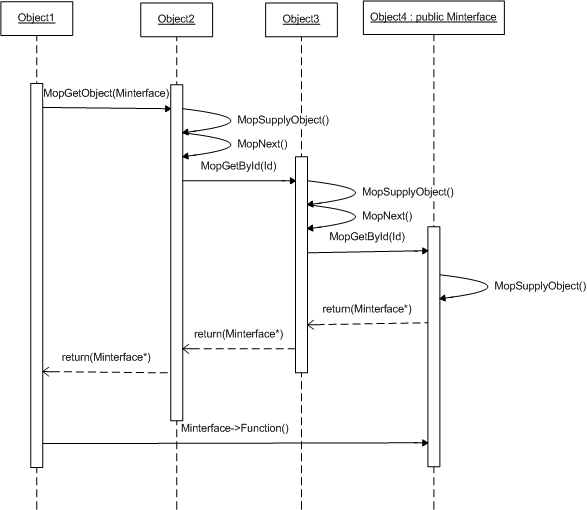The object provider (MOP) mechanism
Purpose
The object provider mechanism exists to enable control types to be established at run time. It's a form of Run Time Type Identification (RTTI). More specifically it allows a caller to find a control in the run-time hierarchy that implements a particular interface, or mixin. From the caller's point of view it's pretty simple: all that's required is to ask a control, any control, to get an object that supports the specified interface, cast the pointer returned to the correct interface and then call the desired function.
History
The Object Provider interface pre-dates the parent pointer in CCoeControl. Instead it uses a MopParent pointer which is normally the parent control but may be the AppUi or even the CoeEnv object. It was designed to meet Series 60 requirements for navigation of the run-time hierarchy. Internally it is now implemented by the framework using the parent pointer where possible which simplifies the control development process.
Description
Interfaces are only identifiable by the Object Provider framework if they have an associated Interface UID. The Interface UID must be declared in the class definition. Fortunately the UID is invisible to the caller which simply uses the interface (mixin) name.
A class which implements an identifiable mixin, i.e. one with an Interface UID, can 'supply' a pointer to itself when the Object Provider framework requests it. If a control is not able to supply the mixin requested it passes the request on to the next control in the hierarchy.
The sequence diagram below illustrates the Object Provider process for supplying an interface pointer from the run-time hierarchy.
Object1 wishes to call a function on MInterface. It calls MopGetObject() on the nearest control in the run-time hierarchy. The Object Provider Framework identifies the Uid for Minterface and then passes the request up the hierarchy until an object is found (Object4) that implements Minterface.
Calling MopGetGetObjectNoChaining() will call MopSupplyObject() but not MopNext(). It returns Null if the class does not implement the specified mixin.
Copyright ©2010 Nokia Corporation and/or its subsidiary(-ies).
All rights
reserved. Unless otherwise stated, these materials are provided under the terms of the Eclipse Public License
v1.0.
